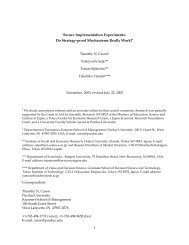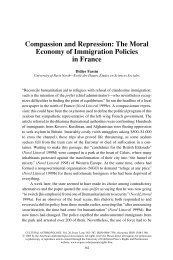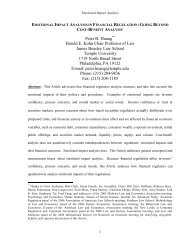The Tools of the Master Slavery and Empire in Nineteenth Century ...
The Tools of the Master Slavery and Empire in Nineteenth Century ...
The Tools of the Master Slavery and Empire in Nineteenth Century ...
You also want an ePaper? Increase the reach of your titles
YUMPU automatically turns print PDFs into web optimized ePapers that Google loves.
<strong>The</strong> <strong>Tools</strong> <strong>of</strong> <strong>the</strong> <strong>Master</strong>:<br />
<strong>Slavery</strong> <strong>and</strong> <strong>Empire</strong> <strong>in</strong> N<strong>in</strong>eteenth <strong>Century</strong> Egypt<br />
... <strong>the</strong> master’s tools will never<br />
dismantle <strong>the</strong> master’s house.<br />
—Audre Lorde 1<br />
In August 1894, a Bedou<strong>in</strong> slave dealer named Muhammad Shaghlub led a small caravan<br />
to a stop <strong>in</strong> <strong>the</strong> village <strong>of</strong> Kerdessa, with<strong>in</strong> sight <strong>of</strong> <strong>the</strong> Great Pyramids <strong>of</strong> Giza. <strong>The</strong> caravan<br />
consisted <strong>of</strong> six Sudanese women, purchased hundreds <strong>of</strong> miles to <strong>the</strong> south, who had<br />
made <strong>the</strong> slow walk barefoot with Shaghlub <strong>and</strong> three o<strong>the</strong>r traders along <strong>the</strong> Forty Days’<br />
Road, <strong>the</strong> old <strong>and</strong> well-traveled trade route that ended <strong>in</strong> lower Egypt. All were exhausted<br />
upon reach<strong>in</strong>g Kerdessa, but Shaghlub perservered. After hid<strong>in</strong>g <strong>the</strong> women on <strong>the</strong> top floor<br />
<strong>of</strong> a house owned by an accommodat<strong>in</strong>g friend he left for Cairo to negotioate buyers for <strong>the</strong><br />
six women. 2 In his absence, <strong>the</strong> six women waited <strong>in</strong> this room, under admonition to be<br />
silent <strong>in</strong> <strong>the</strong> hot <strong>and</strong> cramped quarters.<br />
Why such caution <strong>and</strong> secrecy? Shaghlub <strong>and</strong> <strong>the</strong> o<strong>the</strong>r traders were only too aware<br />
that be<strong>in</strong>g caught with six African women by <strong>the</strong> authorities <strong>of</strong> <strong>the</strong> Slave Trade Bureau<br />
would mean imprisonment. Trade <strong>in</strong> African slaves had been abolished <strong>in</strong> Egypt <strong>in</strong> 1877,<br />
<strong>and</strong> <strong>the</strong> Bureau had been created to search for unlawful caravans <strong>and</strong> enforce <strong>the</strong> abolition.<br />
When Muhammad Shaghlub left Kerdessa to scout <strong>the</strong> streets <strong>of</strong> Cairo for buyers, he would<br />
have done so with great care. Through whispered <strong>in</strong>quiries <strong>in</strong> a c<strong>of</strong>fee shop, he found a carriage<br />
driver who dealt with <strong>the</strong> servants <strong>of</strong> elite households, a man <strong>in</strong> position to know which<br />
families were eager to buy a Sudanese slave woman or two. With<strong>in</strong> several days, Shaghlub<br />
had found four wealthy buyers, <strong>and</strong> <strong>the</strong> six women were placed <strong>in</strong>to new homes. <strong>The</strong> most<br />
prom<strong>in</strong>ent <strong>of</strong> <strong>the</strong>se buyers was Ali Pasha Sharif, <strong>the</strong> head <strong>of</strong> <strong>the</strong> Egyptian Legislative<br />
Assembly. In an irony that would quickly make this sale a cause célèbre, Ali Pasha<br />
had—only weeks before—used <strong>the</strong> floor <strong>of</strong> <strong>the</strong> Assembly to petition <strong>the</strong> government to close<br />
down <strong>the</strong> many <strong>of</strong>fices <strong>of</strong> <strong>the</strong> Slave Trade Bureau. In his arguement, he went so far as to say<br />
that <strong>the</strong> practice had been discont<strong>in</strong>ued for so long that Egyptians had forgotten <strong>the</strong> very<br />
mean<strong>in</strong>g <strong>of</strong> <strong>the</strong> words “slave trade.”<br />
<strong>The</strong> authority to whom Ali Pasha appealed was <strong>the</strong> government <strong>of</strong> Egypt, but he was<br />
well aware that this was not a government run by Egyptians. Ra<strong>the</strong>r than send<strong>in</strong>g his petition<br />
to <strong>the</strong> Egyptian khedive `Abbas Hilmi II, Ali Pasha sent it to Lord Cromer, <strong>the</strong> British<br />
consul-general who had run <strong>the</strong> economic <strong>and</strong> political <strong>in</strong>frastructure <strong>of</strong> <strong>the</strong> country s<strong>in</strong>ce<br />
<strong>the</strong> British military occupation <strong>of</strong> 1882. While <strong>the</strong> petition’s ma<strong>in</strong> po<strong>in</strong>t was to contrast <strong>the</strong><br />
high salaries paid to all British civil employees <strong>and</strong> <strong>the</strong> very low wages paid to <strong>the</strong>ir Egyptian<br />
equivalents, he made a particular example <strong>of</strong> <strong>the</strong> bloated <strong>in</strong>comes <strong>of</strong> <strong>the</strong> British agents who<br />
worked for <strong>the</strong> Slave Trade Bureau, a commission set up <strong>in</strong> 1884 to manumit African slaves<br />
seek<strong>in</strong>g <strong>the</strong>ir freedom. Why were <strong>the</strong>re so many <strong>of</strong>ficials, Ali Pasha compla<strong>in</strong>ed to Cromer,<br />
when <strong>the</strong>re were hardly any slaves?<br />
Unfortunately for Ali Pasha Sharif, Cromer did not agree with this l<strong>in</strong>e <strong>of</strong> reason<strong>in</strong>g. In<br />
response to Ali Pasha’s petition, he ordered <strong>the</strong> Slave Trade Bureau to be doubly vigilant <strong>in</strong>
















